County Head Says Vaccination Problem Prompted by PM
ZAGREB, 17 February 2021 - Primorje-Gorski Kotar County head Zlatko Komadina on Wednesday said the problem of vaccination was prompted by Prime Minister Andrej Plenković, describing as inappropriate his announcement that county public health institutes would become chapters of the national public health institute.
In an interview with the N1 broadcaster, Komadina said that he understood that the prime minister was not having an easy time in the current pandemic, but that by threatening that he would revoke the regional status of local public health institutes he was trying to dictate expert opinions.
"Not all of the expertise is concentrated in the government, there are experts wherever there are medical schools, and what is happening now is a consequence of delays in the adoption of the protocol on the order of vaccination," Komadina said.
Komadina confident PM will give up his plan
He went on to say that counties were founders of regional public health institutes and that the prime minister made the statement about turning them into chapters of the national public health institute "in the heat of the moment" and that he would eventually abandon his plan if he reconsidered it.
Plenković on Tuesday commented on a proposal by Primorje-Gorski Kotar County not to vaccinate people over 60 with the AstraZeneca vaccine for some time, which prompted him to announce amendment of the Act on Teaching Institutes of Public Health.
"We must prevent county public health institutes from pursuing their own policies that are contrary to those of the World Health Organisation and the European Medicines Agency and to the position of the Croatian Public Health Institute, and from sending discouraging messages to people over the age of 65," said the PM, announcing that the relevant law would be amended as soon as possible to prevent such cases.
No need for nervousness, accusations about politicking
Komadina said that local teaching institutes of public health had decided on their own in which order and how to vaccinate people because they lacked the relevant instructions from the state.
"Now those instructions have arrived and I don't see any reason for nervousness on the part of PM Plenković or for accusations about politicking," he said.
Komadina said that the county public health institute had vaccinated people with available vaccines, that it did not refuse to vaccinate anyone and had only given recommendations as to which categories of the population could be vaccinated.
"Before the instruction from the state level, the county institute called people under 60 with chronic diseases. The next round of vaccination will be in line with the recommendation of the national COVID-19 response team," he said, noting that the situation was similar in many other EU countries and that German Chancellor Angela Merkel had said that people above the age of 55 would not be vaccinated with the AstraZeneca vaccine.
Next round of vaccination in line with national response team's recommendations
"I consider that ambiguity resolved now and the next round of vaccination will proceed in line with the national COVID-19 response team's recommendations," he stressed.
Komadina noted that the head of the county institute of public health, Vladimir Mićović, was a professor of epidemiology and had extensive experience in the field.
"People have the right to their own opinion and one should not hold it against them," he said.
Mićović said on Monday that family doctors in the county had been recommended, if a doctor or a patient were uncertain regarding the effectiveness of the AstraZeneca vaccine, to vaccinate slightly younger people, of 60 years of age or younger.
According to information on the characteristics of the vaccine, it is clearly stated that there are no doubts regarding the effectiveness of the vaccine in that category of the population, he said.
"It was our suggestion that they should vaccinate all elderly people... but that if they have certain doubts... to vaccinate slightly younger categories of people with chronic and serious diseases," Mićović said at the time.
If Deal is Reached, Sputnik V Will Arrive in 2-3 Weeks - Russian Embassy Official
ZAGREB, 17 February 2021 - The Russian COVID-19 vaccine can be delivered to Croatia within two to three weeks provided that the two countries reach an agreement to that effect, Russian Embassy spokesman Matvey Sidorov told Hina on Wednesday.
Croatian Health Minister Vili Beroš said on Wednesday morning that the government was considering purchasing the Russian-made Sputnik V vaccine even before its approval by the European Medicines Agency (EMA).
As for the amount of vaccine that might arrive in one shipment, Beroš said that this depended on Croatia's logistical capabilities given that vaccines had a shelf life.
Citing sources close to the government, Jutarnji List newspaper said on Tuesday that the amount in question was one million doses.
Sidorov said that this depended on an agreement with the manufacturer, the Russian Direct Investment Fund, but that otherwise there were no limitations.
The EU is not preventing its member states from purchasing vaccines from manufacturers with which the Commission has not concluded an agreement, as is the case with Sputnik V. Any member state that purchases such a vaccine is responsible for its approval and the vaccine can be used only on its own territory. Hungary is the only EU member state to have done so.
Russia reportedly intends to request EMA's approval for its vaccine in April.
In the event of an agreement with Russia, Croatia has two options: it can either have the Sputnik V vaccine delivered to Croatia and store it pending EMA's approval or it can approve the vaccine itself and start using it as soon as it arrives.
Croatia Reports 502 New Coronavirus Cases, 18 Deaths
ZAGREB, 17 February 2021 - Croatia has recorded 502 new coronavirus cases and 18 related deaths in the last 24 hours, the national coronavirus response team reported on Wednesday morning.
The number of active cases currently stands at 2,219. Among them are 884 infected people who are receiving hospital treatment, including 82 who are on ventilators.
A total of 11,050 people are currently self-isolating.
Since 25 February 2020, when the first case was confirmed in the country, 238,501 people have been infected with the novel virus, of whom 5,375 have died and 230,907 have recovered, including 224 in the last 24 hours.
A total of 1,282,357 people have been tested to date, including 7,348 in the last 24 hours.
Coronavirus Allowance for Croatian Pensioners Coming?
February the 17th, 2021 - Are Croatian pensioners set to get a boost to their monthly income in the form of coronavirus allowance? If so, for some that amount could be as much as an additional 200 euros.
As Poslovni Dnevnik writes, the Labour Miniser Josip Aladrovic stated recently that given the severity of the economic situation caused by the spread of the novel coronavirus, compensation must be provided, from which it could be concluded that the Croatian Government is seriously considering the payment of one-time assistance to Croatian pensioners.
Croatian Pensioners' associations previously requested the payment of a one-time coronavirus pension supplement which would be calculated depending on the existing monetary amount of an individual person's pension.
For Croatian pensioners with pensions up to 2710 kuna per month, the supplement would be as much as 200 euros, people whose pensions are from 2710 to 5000 should, according to them, receive 100 euros each, and single people with a monthly pension of more than 5000 kuna should receive 50 euros, according to a report from Vecernji list. For this proposed one-time payment to Croatian pensioners, the state budget would have to provide around 1.1 billion kuna, Minister Aladrovic emphasised during a weekly show held on Croatian Radio.
''We're aware that some countries have paid out coronavirus allowances related to the increase in material costs of retirees during this trying period. We also need to find some sort of model of compensation. At the same time, the indexation of pensions is coming, for which we will see in just ten days how much it will be. When we know how much our indexation is, we will know precisely how much our fiscal capacity is,'' said Minister Aladrovic.
Looking at this year's budget, there is currently no money in it for coronavirus pension supplements, but the local elections in May are quickly approaching, so that argument could be more crucial given the country's fiscal capabilities, as Croatia should provide about 42 billion kuna for pensions this year.
However, in addition to the state budget, such a payment may be covered by some social programmes of the European Commission (EC).
For the latest travel info, bookmark our main travel info article, which is updated daily.
Read the Croatian Travel Update in your language - now available in 24 languages.
Beroš: Croatia Agrees Cooperation with Russia on Vaccine Procurement
ZAGREB, 17 February 2021 - Croatia has agreed cooperation with Russia on the procurement of its Sputnik V vaccine against COVID-19, Health Minister Vili Beroš said in an interview with commercial broadcaster Nova TV on Tuesday evening.
Beroš said that there was growing evidence that the Russian vaccine was effective, but that more evidence was needed to prove that it was safe. He expressed reservations about Hungary's approach, adding that Hungary had resorted to temporary use of the Sputnik V vaccine even though it was not approved by the European Union and that there was a possibility of side effects developing.
"It would be optimal if the European Medicines Agency (EMA) approved the vaccine because it has very high criteria. The Russian ambassador has told me that they are expecting EMA's approval possibly in early April and that he will keep me informed," Beroš said, adding that Russia was ready for cooperation.
"Imagine if we imported a vaccine and certain side effects and transgenerational problems were reported," he warned and said that the Croatian Agency for Medicinal Products and Medical Devices (HALMED) could, in cooperation with EMA, make an assessment of the vaccine in two to three days, and if everything was all right, the Russian vaccine could be delivered to Croatia very quickly.
Beroš said that Croatia was expecting larger quantities of vaccine from other sources and that the vaccination of citizens, which is running behind schedule, would be speeded up.
Russian Embassy is in touch with Croatian authorities
The Russian Embassy in Croatia is in touch with the authorities in Zagreb regarding the procurement of the Sputnik V vaccine, Ambassador Andrey Nesterenko told RIA Novosti news agency on Tuesday.
The Embassy said earlier that Croatian citizens were calling them every day to ask about the procurement of the Russian vaccine.
"We are in contact with the Croatian authorities, but understandably we cannot reveal details given the sensitivity of the matter," Nesterenko said. He added that each country had to decide whether it wanted to buy the Russian-made vaccine or not.
Debts to drug wholesalers
Speaking of debts to drug wholesalers, Beroš said that everything would be done to prevent the blockade of hospitals and that a solution to this problem would be found.
Beroš said that one of the main causes of the debts was an insufficient rate of public allocation for the healthcare system. He said that in Croatia the allocation for the health budget was €861 per capita, which is 8.6% GDP, while the EU average was €3,100. "We will have to increase the allocation for healthcare in the future," he said.
The amount of money that hospitals receive per month is too low and has now been increased. We spend between 23 and 27 billion kuna on healthcare annually, which includes salaries. Salaries have gone up 24% over the last few years, 12% last year alone, and the hospitals were left without money for drug wholesalers so that they could pay out salaries, the minister said.
Split-Barcelona-Split COVID-19 Trip Report, February 11 to 16, 2021
February 17, 2021 - It's been 3 and a half months since I last braved pandemic travel from Croatia to Spain. So, what's changed? My Split-Barcelona-Split COVID-19 trip report, from February 11 to 16, 2021.
At the end of October 2020, I traveled for the first time since the COVID-19 pandemic ravaged Europe. At the time, European countries were still figuring out how to introduce negative PCR tests for entry and defining what entailed being 'high-risk.' This time around, a year deep into the pandemic, it's safe to say most countries have defined requirements that work for them. Furthermore, the information is readily available for travelers online to avoid any mishaps on their journey, which I nearly avoided (more on that later).
Not quite for tourism purposes, I booked my trip to Barcelona to visit my partner who currently plays water polo there. His birthday falls on February 13, conveniently before Valentine's Day, and fortunately, on a weekend when he didn't have any games. Much like my first trip visiting him there, I needed to bring a suitcase of his belongings, which had been sitting in my bedroom since COVID-19 forced him out of Split last March.
Unfortunately, it wasn't much easier getting to Barcelona this time - and thanks to the double whammy of it being the offseason in the middle of a pandemic, not only were ticket prices steep, but the usual two-hour travel time turned into 14-hour travel days from start to finish.
The only available options were on the route from Split-Zagreb-Frankfurt-Barcelona and back, operated by Croatia Airlines and Lufthansa. At least my luggage was included in the ticket price.
I was tested for COVID-19 24-hours before my departure at the Vukovarska testing center in Split. A huge win is that testing prices were halved at the end of January, so instead of paying almost 900 kn for a PCR test and English translation, tests are currently 400 kn and 450 kn with a translation. I was tested at 7:40 am and received my result via email before 5 pm the same day, in English, and with my passport number included (another requirement for Spain).
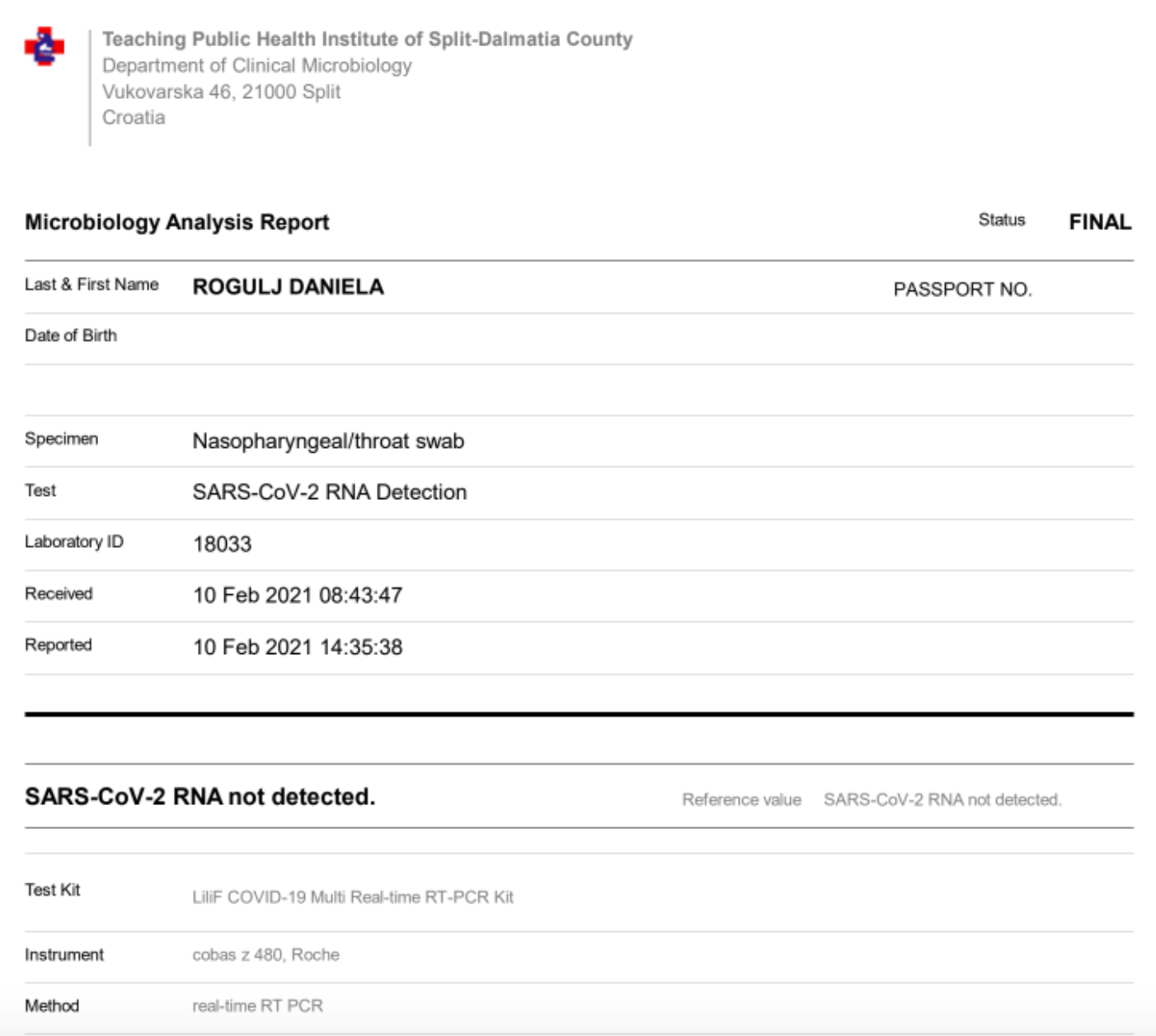
My 6:50 am flight time to Zagreb had me awake at 4 am to make sure I had everything in order. Arriving at the airport with just over an hour to spare, the woman at the check-in counter ensured I had a negative COVID-19 test in hand and confirmed that I had completed the health registration form for Spain as I'd need the QR code to enter the country. I did.
"You're my favorite kind of traveler."
As you can imagine, Split Aiport doesn't have much going on before 6 am, especially during corona times, so I was through security and at my gate with plenty of time to spare. My flight to Zagreb was nearly full.
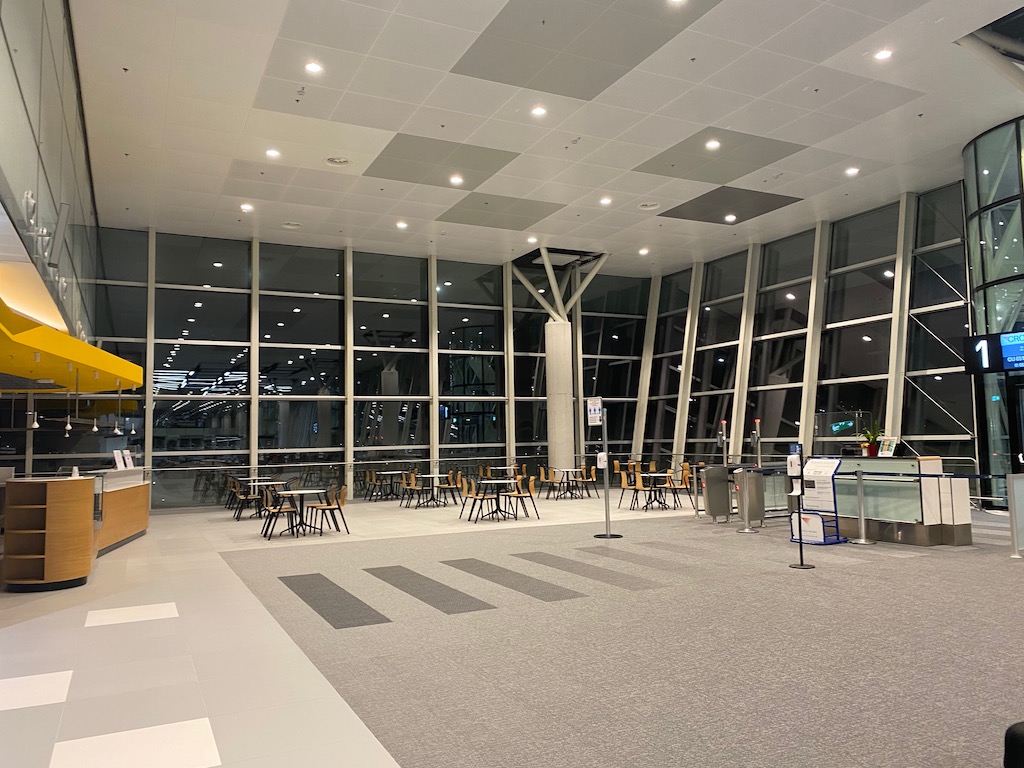
My quick connection in Zagreb had me there long enough to examine that Costa coffee was open for to-go drinks and pastries, and Duty-Free welcomed a few shoppers. Other than that, there is not much to do but stare and each other's masks while waiting to board.
Observation: Unlike when I traveled in October, the airport staff was not concerned with the type of mask passengers wore. Last time, we were only allowed disposable surgical masks, which were checked and distributed if needed before boarding. This time, cloth, filter, and disposable masks were accepted.
Croatia Airlines shared disinfectant wipes to all passengers once they boarded the flight.
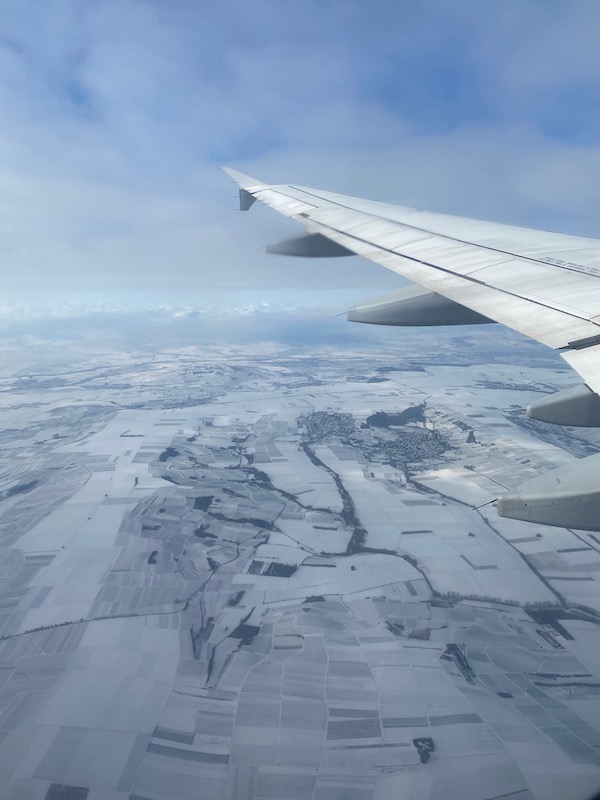
My arrival in Frankfurt was smooth, and a quick trip through security brought me to my gate two hours before my departure to Spain. Frankfurt airport was busy with travelers, but only cafes, hot dog stands, and small convenience shops worked.
All that was needed when boarding for Spain was my ticket and passport - no QR code or test result was checked then, though they did announce on the intercom before boarding that both documents were required. My flight was full.
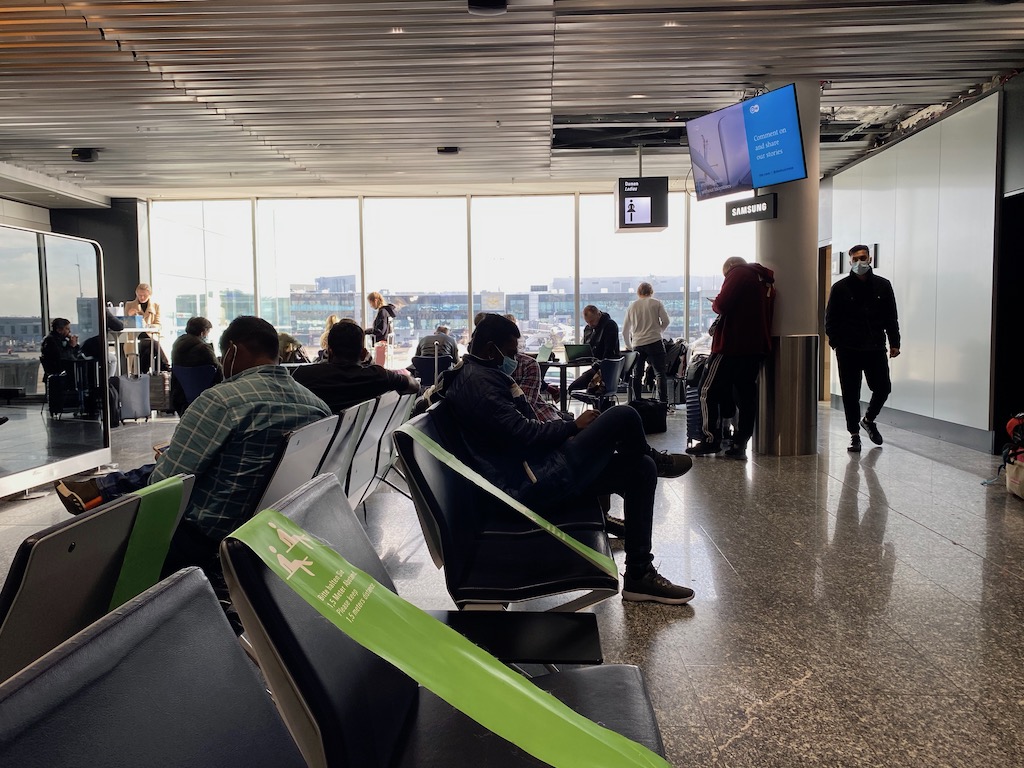
Spain changed their entry requirements in November 2020, two weeks after I visited last time.
"Spanish authorities require all passengers traveling to Spain to complete the FCS health control form (exceptions are passengers in transit). The generated QR code must be presented upon arrival. All travelers to Spain over 6 years of age must have a medical certificate with a negative COVID-19 RT-PCR or TMA test result. The test must have been taken at most 72 hours before arrival, and the certificate must be in English, German, French, or Spanish. Spanish authorities may impose fines up to EUR 6000 per person to passengers who do not comply with entry regulations," Lufthansa alerted me before my flight.
We arrived in Spain and headed to baggage claim, though not before we entered an area marked for health checks, with airport officials showing passengers to one of two lines. I was ushered into the line where my entry QR code was scanned (and no COVID-19 test checked), while the other line had various health officials checking test results and QR codes. I arrived at baggage claim 30 seconds later and received an email from Spanish health officials welcoming me to Spain.
Another thing that was different in Spain this time is that restaurants and bars are open for indoor and outdoor dining, albeit during two-time blocks - in the morning for breakfast from 7:30 am to 10:30 am and for lunch from 1 pm to 4:30 pm. While there is still a curfew between 10 pm and 6 am, delivery works until 11 pm. Barcelona closed indoor and outdoor dining a week before I arrived in October.

This was a game-changer, given that bars and restaurants have been closed for indoor and outdoor dining in Croatia since November.
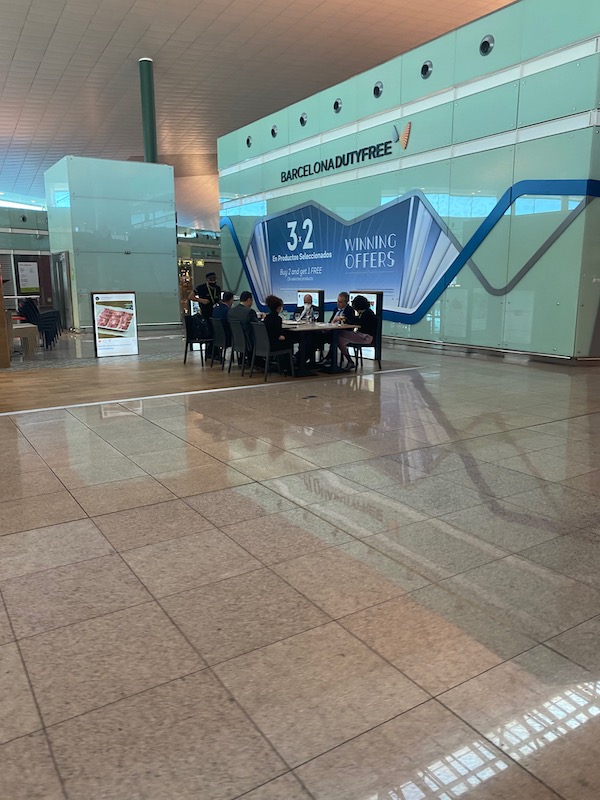
Like my last trip to Barcelona, masks are mandatory inside and outside, and it's rare to find anyone not following the rules. Shoppers sanitize their hands upon entering any store, and the discipline of the citizens does not go unnoticed.
Twenty-four hours before my flight back to Croatia, I took a PCR test at a local clinic that promised same-day results. The price was not as friendly as in Croatia (85 euro), but I wanted to ensure I was healthy returning home, especially since I would be in contact with my high-risk mother who babysat my cats while I was away.
Recall, if you do not show a negative PCR test, no older than 48 hours, upon arrival in Croatia, you are subject to self-isolation until you can show a negative PCR test, which is done at your expense. More on that here.
The testing experience in Spain was also a bit... aggressive. The nurse swabbed deep into each nostril for 10 seconds and continued to all corners of my mouth and gums, unlike the far more delicate experiences I've had in Croatia. I received my negative test result the same day, around 6 pm.
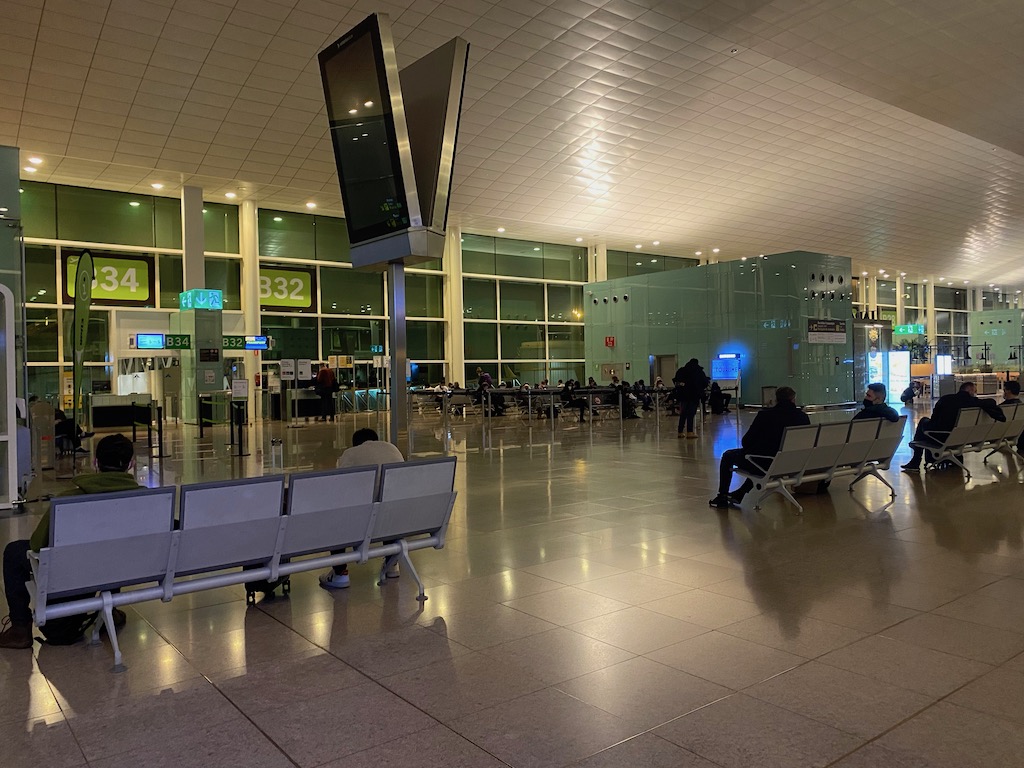
After a full four days in the Catalonian capital, it was time to return home on yet another 6 am flight and 3:30 am wake-up call. The agent at the check-in counter asked to see my negative test before checking my bag and continuing to security. My flight to Frankfurt was half full, and there was no one sitting between me and my row-mate.
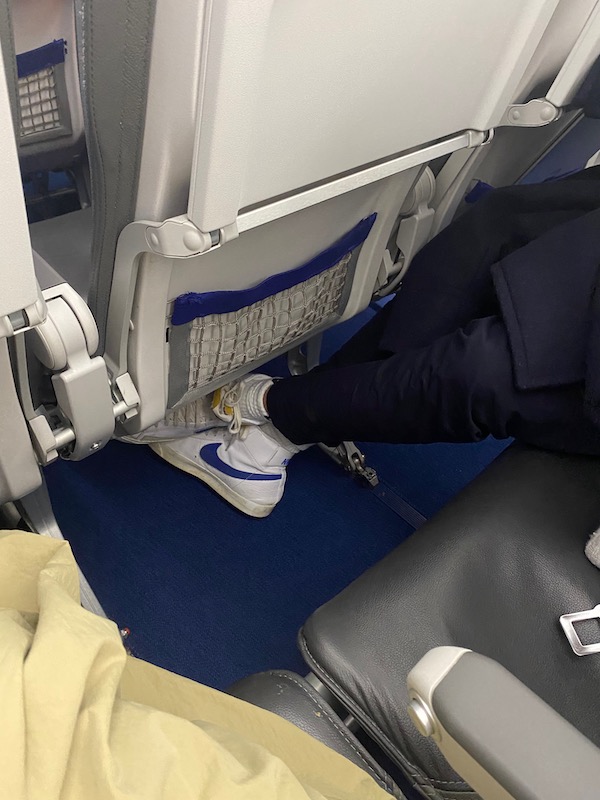
Once we disembarked the plane in Frankfurt, German police greeted us to check that passengers staying in Germany had the correct documentation. Since I was on my way to Split, they sent me along.
With a few hours to spare before my flight to Zagreb, I felt a sense of relief as I was halfway home. I went to the gate only to find passengers boarding to Seattle before us - I don't think there were more than 20 passengers on that plane.

Boarding for Zagreb was slower than normal as the buses that transported passengers from the gate to the plane arrived 20 minutes apart. There was not a free seat on the always-fun propellor plane journey to Zagreb. We were asked to fill out health forms during the flight, which the flight attendants collected and turned into the authorities once we arrived.
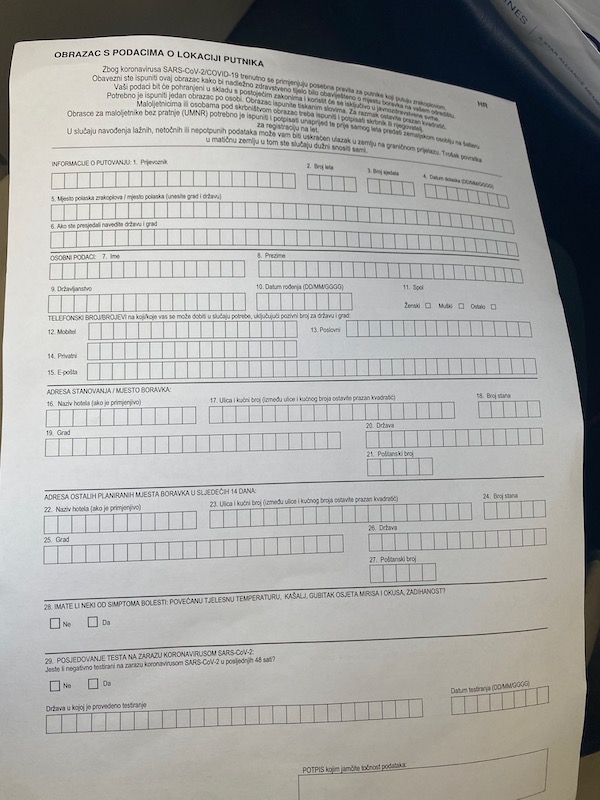
Despite leaving 10 minutes later than scheduled, we arrived in Zagreb on time, or at 1:35 pm, with just enough time for my flight to Split, departing at 2:35 pm. While this would almost always be more than enough time to connect for a domestic transfer at Zagreb Airport, especially during pandemic times, Zagreb managed the unthinkable.
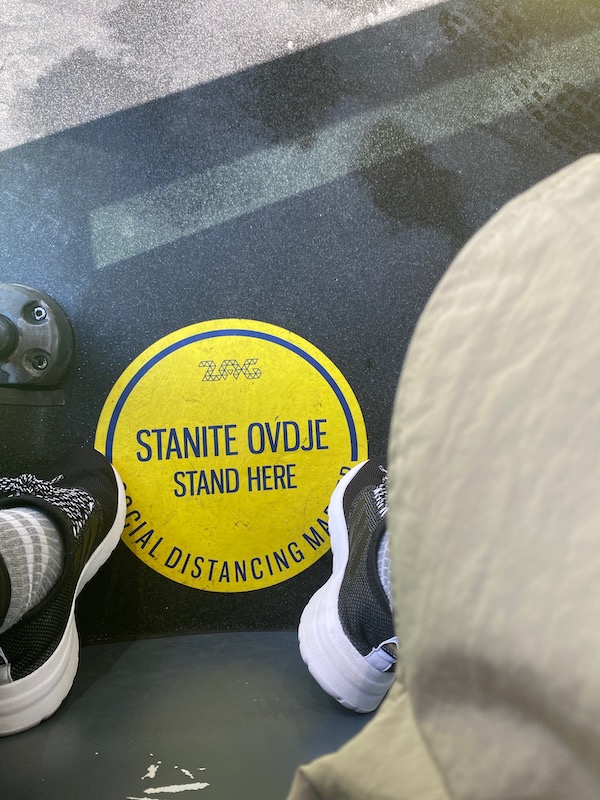
Around 25 people from my Frankfurt flight continued onto a domestic transfer, which resulted in a larger line at passport control - but only in extraordinary circumstances could this affect me making my flight, I thought.
However, only one passport control officer was on duty, spending on average 3-5 minutes with each passenger who:
1.) Didn't know they needed a negative PCR test to enter Croatia and tried avoiding mandatory self-isolation for various reasons, which resulted in phone calls, and even the arrival of a new officer, who didn't think to jump in and help check tests or documents
3.) Had the wrong type of test and complained that they didn't know they needed a PCR test to enter Croatia
4.) Had a negative PCR test to enter, which the officer required you send to his email right then and there.
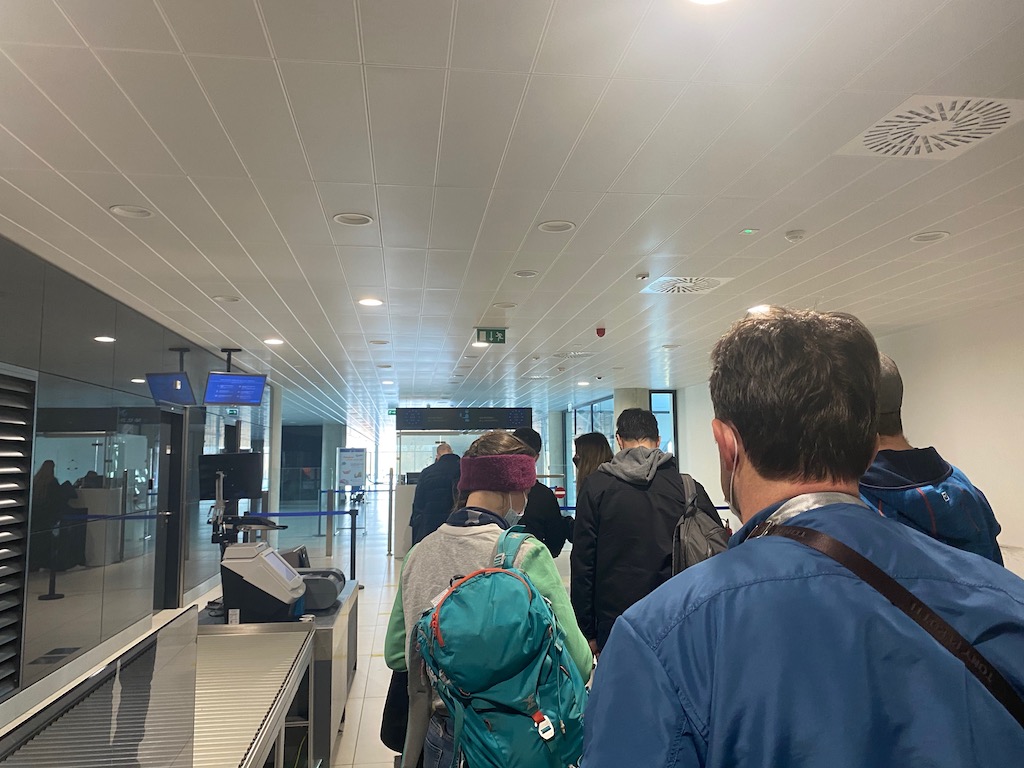
Boarding for my flight was at 2:15 pm, and around 2:00 pm, with another 15 or so still in front of me, I began to worry. Unsurprisingly, there was no one there to speak to apart from the lone worker at passport control.
At 14:18, they called final boarding for Split. I panicked, as did the 7 or so passengers behind me who were also connecting to Split. I asked the man in front of me who was traveling to Dubrovnik if I could sneak in front. I approached the counter and informed the officer they called final boarding for Split and had all of my documents and test ready to go.
He could not have cared less - nor did he hurry in the least.
He looked at my test, told me to send him an email of it, took my phone to enter the email address, and asked for my phone number. After 3 minutes, it was over, I rushed to my gate and informed them there were still others waiting at passport control, unsure of how long it would take. I finally boarded the plane, though the remaining passengers took another 15 minutes to arrive. All because of one officer at passport control.
We arrived in Split safe, sound, and somehow on time, with our bags arriving shortly after.
It was smooth sailing, that is until we arrived back in Croatia. While PCR tests no later than 48 hours old are required to avoid going into self-isolation, Zagreb Airport may want to consider adding a second officer in the passport area when flights land - or you may want to re-think the timing of your domestic transfer.
For the latest travel info, bookmark our main travel info article, which is updated daily.
Read the Croatian Travel Update in your language - now available in 24 languages.
Index: Cafe Terraces Open In Two Weeks If Numbers Stay Low
February 17, 2021 – Indoor sports return and cafe terraces open on Monday 1st March if infection numbers remain low, learns Croatian media outlet Index.
By the time spring arrives, Croatian coffee lovers should be back enjoying their drinks outside their favourite cafe bar. Cafe terraces open on Monday 1st March 2021 if Coronavirus infection numbers remain low and stay on their current trajectory, according to Croatia media outlet Index.
Indoor sports will also return on the same date, with the same stipulation that infection numbers remain low. Having cafe terraces open again cannot come too soon for frustrated business owners. At the moment, they are only permitted to serve coffee to go. According to Index, from on Monday 1st March 2021, cafe terraces open and people will no longer need to congregate on the street outside, in parks or on benches to enjoy their drinks.
“Measures should be further relaxed throughout Croatia as of March 1, including the much-anticipated opening of cafe terraces,” says the portal. Cafe terraces open and other relaxed measures depend on the prerequisite of figures remaining at the level they are at now. “The share of newly infected in the number tested in recent days is below five percent,” Index adds.
Headquarters and the government had already announced that the next round of concessions could be expected in early March.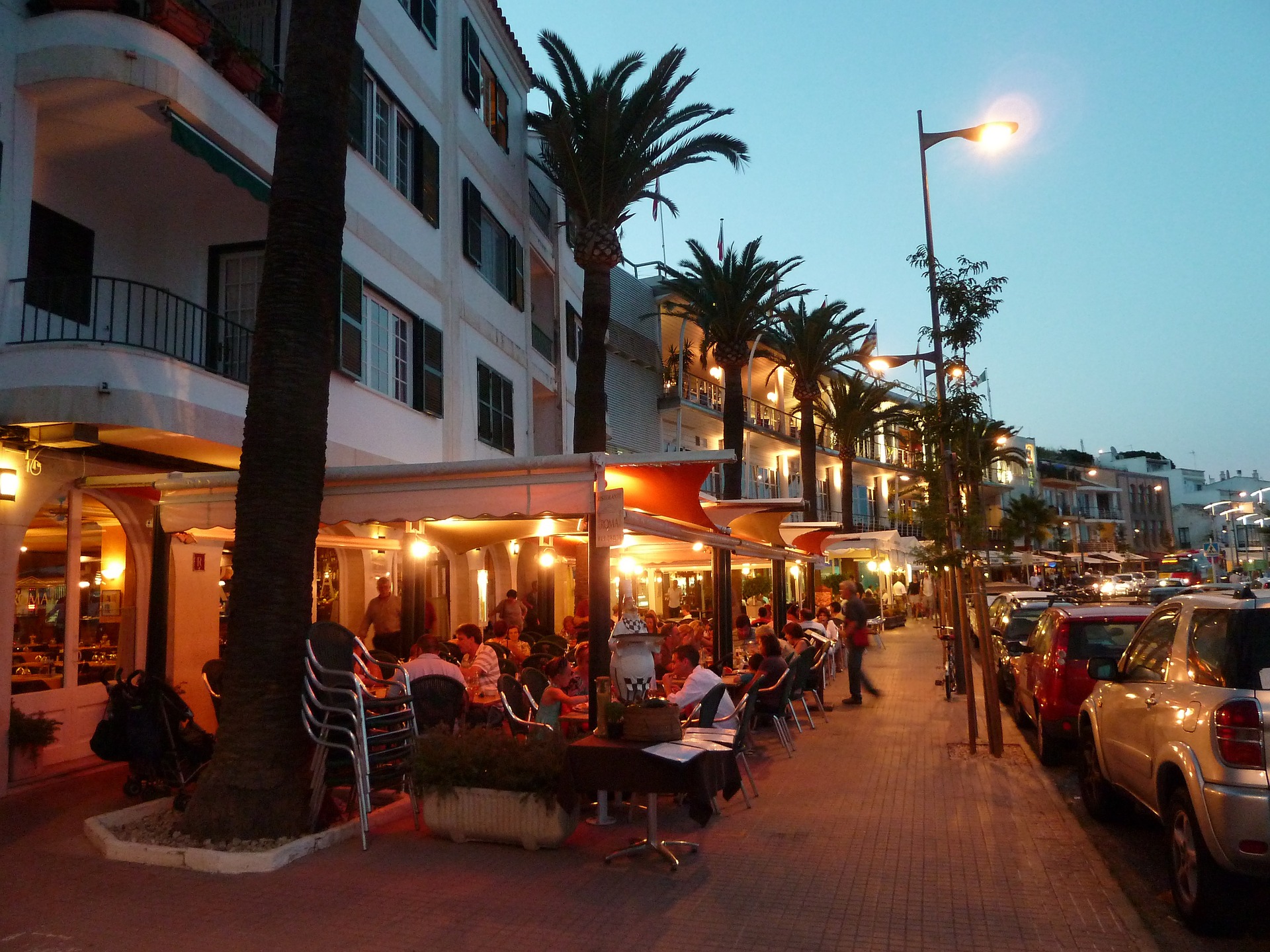 Cafe terraces open in Croatia from March 1st 2021, if Coronavirus numbers remain low, say media outlet Index
Cafe terraces open in Croatia from March 1st 2021, if Coronavirus numbers remain low, say media outlet Index
Croatian cafe terraces open, the interior of cafes and restaurants remain closed
“As we find out, the terraces of cafes and restaurants will definitely open on March 1,” wrote Index. “However, according to information from a source close to the Headquarters, the closed (interior) parts of cafes and restaurants will not be opened. (This) is realistically expected in April at the earliest.”
“Once cafe terraces open, guests will most likely not be able to enter the interiors of cafes and restaurants, except perhaps for the use of toilets, to prevent indoor parts of cafes and restaurants from being used and guests being served there. Closed spaces are still considered by headquarters (to be) an extremely high risk when it comes to the spread of coronavirus.”
Further relaxation of Coronavirus measures: Indoor sports to return
According to Index, although the first information received said that from March 1, only indoor sports for children would be opened, the portal has discovered that instead all indoor sports should be opened, with prescribed epidemiological measures. They remind that, according to current measures, only gyms, swimming pools and contactless individual ball sports are allowed.
Public gatherings / marketplaces / fairs
“There should be concessions when it comes to fairs, but it is not yet completely clear under what conditions,” says the portal. Like supermarkets, open-air and indoor markets are currently permitted to operate. The newly relaxed measures will pertain to similar, but more irregular events at which arts & crafts, books and other goods are on display for sale. The portal say that the vending and consumption of food – which is traditional at such events – will likely not be permitted for now.
“The headquarters is inclined to open fairs where products are sold or exhibited, but the consumption of food and drinks might be limited to prevent excessive gatherings and socializing,” they say.
Relaxation of Coronavirus measures pertaining to private gatherings
“The allowed number of people at various gatherings should not change significantly, only minor corrections are possible,” claims the portal, adding that the current ban on the gathering of people from more than two households may instead be downgraded to a recommendation. The portal reminds that this measure has not been strictly enforced in any way before.
"To give way on March 1, the numbers have to stay at about the level they are now. But the pressure is great - no one wants to keep something closed that should not be kept closed. Most of it is already open, so there remains a narrow circle of what can still be given,” a source close to the Headquarters is quoted as telling Index.
Friction between regional and national authorities over easing of Covid-19 measures
Even if cafe terrace open on March 1st, Index concludes their article by reminding that a disparity between regional and national authorities is still causing some friction. The friction between two north-westerly regions of the country and national headquarters is specifically addressed.
“The Headquarters believes that the announcement of the Istrian Headquarters that they will open the terraces of cafes and restaurants on March 1 was very incorrect. They (national headquarters) say that this opening is planned at the level of the whole of Croatia anyway.”
“However, the decision of the Primorje-Gorski Kotar headquarters, which postponed the opening of bookmakers and casinos in that county, is perhaps even more critically commented on. The government states that the opening of bookmakers (betting shops) and casinos is a purely financial decision and ironically comments that if the Primorje-Gorski Kotar County wants to leave these facilities closed, they should (themselves) cover the costs that will be incurred,” says the Index article.
Index claims that these moves from Istria and Rijeka (Primorje-Gorski Kotar) are regarded in the National Headquarters and the government as politicking and that they are connected with the upcoming local elections.
For the latest travel info, bookmark our main travel info article, which is updated daily.
Read the Croatian Travel Update in your language - now available in 24 languages
PM: Local COVID-19 Response Teams Can Only Tighten Restrictions, Not Relax Them
ZAGREB, 16 February, 2021 - Prime Minister Andrej Plenković said on Tuesday that he did not understand how the COVID-19 response team in Istria County could plan to allow cafes to reopen terraces on March 1 if local teams could only tighten restrictions adopted at the national level but not relax them.
"I don't understand it because they can only tighten restrictions adopted at the national level, not relax them," Plenković said during a visit to Makarska in a comment on the announcement by the head of the Istria County COVID-19 response team, Dino Kozlevac, that cafes in Istria would open their terraces on March 1 owing to a favourable epidemiological situation in the county.
Possible relaxation of epidemiological restrictions will be decided by the national COVID-19 response team in consultation with the government, the PM said, describing opposition to restrictions defined at the national level as politicking.
Minister of the Interior Davor Božinović, who heads the national COVID-19 response team, said today in a comment on the Istria County COVID-19 response team's announcement that there was no need to use the current epidemic for muscle-flexing ahead of local elections in May this year.
He, too, warned that regional COVID-19 response teams could make decisions to tighten epidemiological restrictions, which have to be approved by the national team, but that they could not relax them before the national team did so.
Plenković also commented on a proposal by Primorje-Gorski Kotar County not to vaccinate people over 60 with the AstraZeneca vaccine for some time, which prompted him on Monday to announce amendment of the Act on Teaching Institutes of Public Health.
"We must prevent county public health institutes from pursuing their own policies that are contrary to those of the World Health Organisation and the European Medicines Agency and to the position of the Croatian Public Health Institute, and from sending discouraging messages to people over the age of 65," said the PM, announcing that the relevant law would be amended as soon as possible to prevent such cases.
Commenting on the decision by the national COVID-19 response team to allow the reopening of betting shops and casinos, he said that they did not do it because they wanted people to gamble.
"We know that if they are closed, they do not pay concession fees to the state while we have to pay them job-retention allowances and cover their fixed costs," he said.
Assistance scheme for quake-hit Banovina to be unveiled on Thursday
He announced that a programme with measures to help the earthquake-hit area of Banovina would be presented at a government session on Thursday.
"The programme is ready, the Economy Ministry has been working on it with other departments. After it is discussed by coordinating bodies, it will be discussed by the government on Thursday."
Plenković believes there will be a tourist season this year.
"The Tourism Ministry campaign has been underway and we are doing our best to make Croatia a safe and attractive destination and to revitalise tourism," he said, noting that current epidemiological figures were good and that the number of new infections was declining both in absolute numbers and in relation to the number of tests.
During his visit to Makarska, Plenković met with Mayor Jure Brkan and his associates and presented them with a contract on the donation of the state-owned, 23,000-square-metre Peškera Forest, a park located by the town beach, to be upgraded by the town authorities.
For the latest on COVID-19 in Croatia, check out the dedicated TCN section.
Croatia Registers 274 New Coronavirus Cases, 18 Deaths
ZAGREB, 16 February, 2021 - In the past 24 hours Croatia has registered 274 new cases of coronavirus and 18 people have died as a consequence, the national COVID response team reported on Tuesday.
There are 1,959 active cases in the country and 11,149 people are in self-isolation. There are 927 hospitalised patients, 84 of whom are on ventilators.
Since 25 February 2020, when the first case was registered in Croatia, there has been a total of 237,999 registered cases of coronavirus and 5,357 deaths as a result.
A total of 230,683 people have recovered from the virus, 299 of them in the past 24 hours.
To date a total of 1,275,009 people have been tested for the virus, including 6,686 in the past 24 hours, the COVID response team said.
For the latest news on coronavirus in Croatia, follow the dedicated TCN section.
For the latest travel info, bookmark our main travel info article, which is updated daily.
Read the Croatian Travel Update in your language - now available in 24 languages.
Health Minister Beros Talks Possible Vaccination Omissions
ZAGREB, 15 February, 2021 - Health Minister Vili Beroš said on Monday he had engaged all stakeholders and requested reports from all medical institutions about possible irregularities in COVID-19 vaccination.
Data are being collected via the vaccination register and a commission has been set up to oversee vaccination, and if there are any discrepancies, it will order an inspection, he told the press. If there are omissions, the cases will be referred to the professional chambers, he added.
Beroš said he was confident he would receive reports from most medical institutions, "as well as from the digital platform," today already. "Very accurately, as stipulated."
Asked if the director of Zagreb's infectious diseases hospital, Alemka Markotić, had abused her office by having her mother vaccinated against COVID, Beroš said the opinion of the relevant institutions was important, not his.
Speaking at the same press conference, Markotić said professionals had said everything concerning her mother's vaccination and that what she said last Friday about the vaccination of one journalist was misinterpreted.
"I didn't enable any journalist to be vaccinated. I know a lot of people. One journalist boasted to someone I know about being vaccinated, it doesn't matter for what, out of turn."
She said her intention had been to prevent condemnation because it was not known if that person, given their medical condition, had reason to be vaccinated. She added that before judging whether someone was vaccinated out of turn or should have been vaccinated, it was necessary to know if indeed anything wrong had been done.
Markotić said her mother qualified for the vaccine, "which has been confirmed by a score of top professionals."
Beroš: We must unanimously say that AstraZeneca's vaccine is effective for the elderly
The press conference heard that 120,603 COVID-19 vaccine doses have been administered to 67,825 persons, including 52,778 who received the second shot, and that the incidence of positive PCR tests is still mildly declining.
Epidemiologist Bernard Kaić said that in theory seven doses could be extracted from one vial.
As for an instruction from Primorje-Gorski Kotar County that those older than 65 should not be given the AstraZeneca vaccine, Minister Beroš said all public health institutes must send a unanimous message about vaccination.
"In talks with the manufacturer and after analysing the questionable elements, we, like many other states, have assessed that, since this vaccine prevents the development of more serious illness and death, it is absolutely justified to vaccinate older people too."
Beroš also said that as of next week people should be able to register for vaccination via a digital platform.
For more on coronavirus in Croatia, follow the dedicated TCN section.


